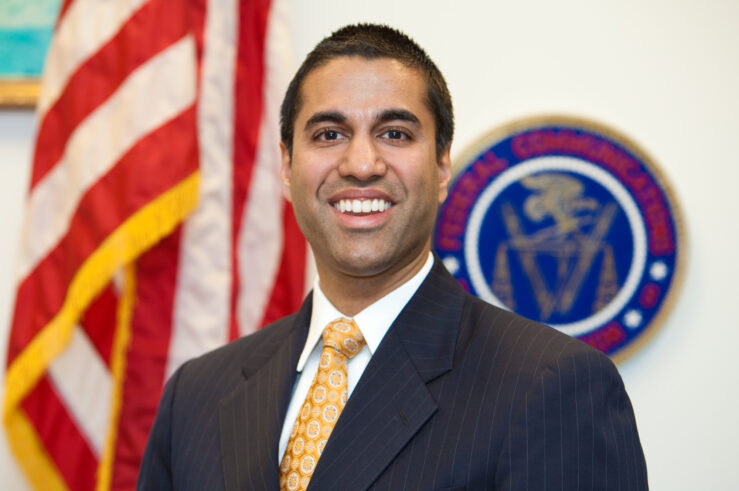Showing results for: “digital markets act”
Right to Anonymous Speech, Part 3: Anonymous Speech and Age-Verification Laws
An issue that came up during a terrific panel that I participated in last Thursday—organized by the Federalist Society’s Regulatory Transparency Project—was whether age-verification laws for social-media use infringed on a First Amendment right of either adults or minors to receive speech anonymously. My co-panelist Clare Morell of the Ethics and Public Policy Center put ... Right to Anonymous Speech, Part 3: Anonymous Speech and Age-Verification Laws
FCC restrictions on joint sales agreements: Yet another FCC rule without basis in evidence or economics
Recently, Commissioner Pai praised the introduction of bipartisan legislation to protect joint sales agreements (“JSAs”) between local television stations. He explained that JSAs are contractual agreements that allow broadcasters to cut down on costs by using the same advertising sales force. The efficiencies created by JSAs have helped broadcasters to offer services that benefit consumers, ... FCC restrictions on joint sales agreements: Yet another FCC rule without basis in evidence or economics
FTC Launches Commercial Surveillance Rulemaking
The Federal Trade Commission (FTC) launched one of the most ambitious rulemakings in agency history Aug. 11, with its 3-2 vote to initiate Advance Notice of Proposed Rulemaking (ANPRM) on commercial surveillance and data security. The divided vote, which broke down on partisan lines, stands in stark contrast to recent bipartisan efforts on Capitol Hill, ... FTC Launches Commercial Surveillance Rulemaking
The Biden Executive Order on AI: A Recipe for Anticompetitive Overregulation
The Biden administration’s Oct. 30 “Executive Order on the Safe, Secure, and Trustworthy Development and Use of Artificial Intelligence” proposes to “govern… the development and use of AI safely and responsibly” by “advancing a coordinated, Federal Government-wide approach to doing so.” (Emphasis added.) This “all-of-government approach,” which echoes the all-of-government approach of the 2021 “Executive ... The Biden Executive Order on AI: A Recipe for Anticompetitive Overregulation
FTC UMC Roundup – Well That Happened Edition
I thought this was going to be a slow week. The Senate is in recess and, with so much recent attention focused on the Senate and AICOA – and the FTC’s had only just started things with the Meta/Within suit – it seemed this would be a slow week. We actually considered taking a recess ... FTC UMC Roundup – Well That Happened Edition
NEW VOICES: FTC Rulemaking for Noncompetes
On July 9, 2021, President Joe Biden issued an executive order asking the Federal Trade Commission (FTC) to “curtail the unfair use of noncompete clauses and other clauses or agreements that may unfairly limit worker mobility.” This executive order raises two questions. First, does the FTC have the authority to issue such a rule? And ... NEW VOICES: FTC Rulemaking for Noncompetes
Arbitration and preemption
Ok, so here’s the deal. AT&T sells two cellular phones for nothing with a two-year contract term, and then charges $30.22 in sales tax. Customers complain about the sales tax. The contract provides for individual arbitration where the customer resides. AT & T will pay double attorneys fees and $7,500 if the arbitrator awards the ... Arbitration and preemption
Broad-Based FTC Data-Privacy and Security Rulemaking Would Flunk a Cost-Benefit Test
A debate has broken out among the four sitting members of the Federal Trade Commission (FTC) in connection with the recently submitted FTC Report to Congress on Privacy and Security. Chair Lina Khan argues that the commission “must explore using its rulemaking tools to codify baseline protections,” while Commissioner Rebecca Kelly Slaughter has urged the ... Broad-Based FTC Data-Privacy and Security Rulemaking Would Flunk a Cost-Benefit Test
Hands Across the Agencies
In the headline to a Dec. 7 press release, the Federal Trade Commission (FTC) announced that it, in concert with the U.S. Justice Department (DOJ) and U.S. Department of Health and Human Services (HHS), had managed to “Lower Health Care and Drug Costs, Promote Competition to Benefit Patients, Health Care Workers.” According to the subhead: ... Hands Across the Agencies
Judge Gorsuch’s Distinguished Antitrust Record
Overview A?merica’s antitrust laws have long held a special status in the ?federal statutory hierarchy. The Supreme Court of the United States, for example, famously stated that the “[a]ntitrust laws in general, and the Sherman Act in particular, are the Magna Carta of free enterprise.” Thus, when considering the qualifications of a nominee to the ... Judge Gorsuch’s Distinguished Antitrust Record
The Supreme Court Puts the Bite on Special Interest Dental Regulations and Strikes a Blow for Economic Liberty
In its February 25 North Carolina Dental decision, the U.S. Supreme Court, per Justice Anthony Kennedy, held that a state regulatory board that is controlled by market participants in the industry being regulated cannot invoke “state action” antitrust immunity unless it is “actively supervised” by the state. In so ruling, the Court struck a significant ... The Supreme Court Puts the Bite on Special Interest Dental Regulations and Strikes a Blow for Economic Liberty
Why a Common Law Approach to Defining “Unfair Methods of Competition” Won’t Work
Section 5 of the Federal Trade Commission Act proclaims that “[u]nfair methods of competition . . . are hereby declared unlawful.” The FTC has exclusive authority to enforce that provision and uses it to prosecute Sherman Act violations. The Commission also uses the provision to prosecute conduct that doesn’t violate the Sherman Act but is, ... Why a Common Law Approach to Defining “Unfair Methods of Competition” Won’t Work










